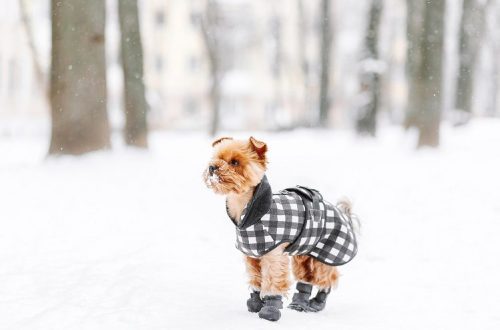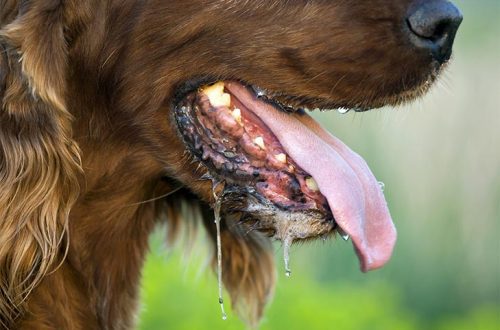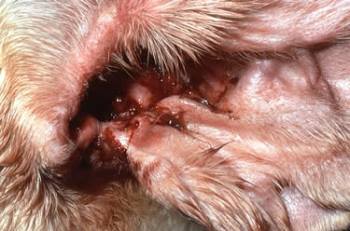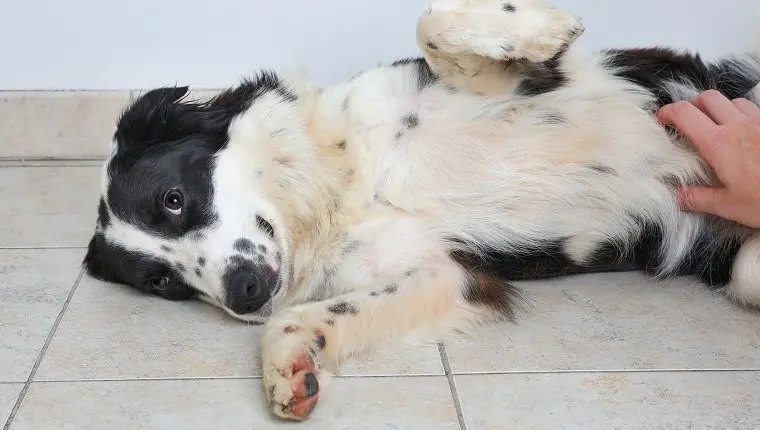
The dog’s stomach growls – why and what to do?
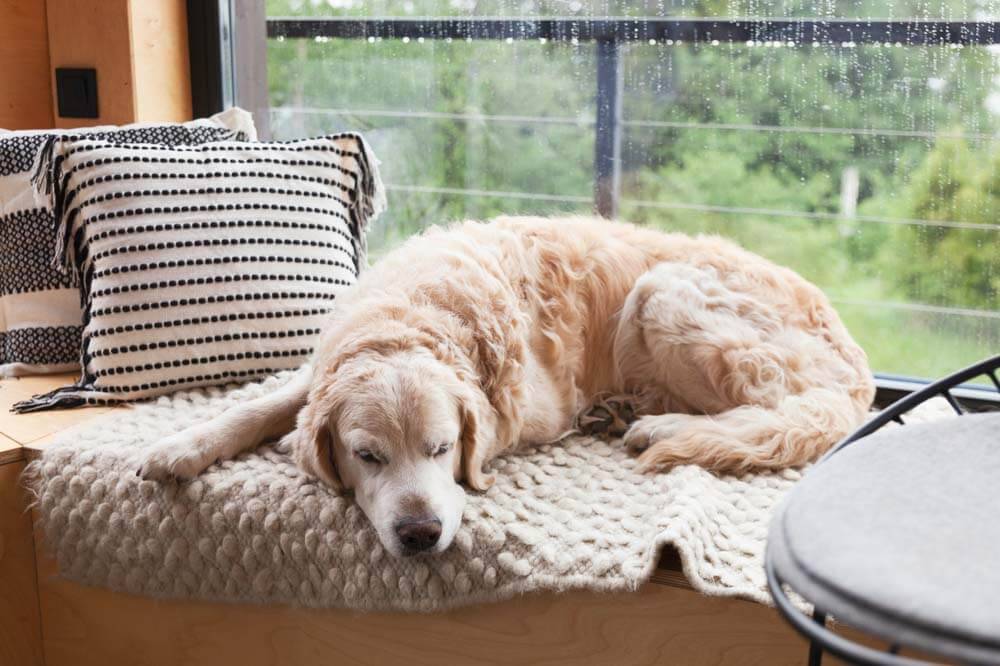
The most common pathological cause of rumbling is flatulence, the accumulation of gases in the stomach and intestines. According to observations, large dogs are most predisposed to this problem – Great Danes, Mastiffs, Cane Corso and others. But this also happens in miniature breeds. Increased gas formation is not the norm.
However, you need to know when it’s okay and when it’s not to protect your dog. Below, we’ll help you learn how to tell the difference and share some of the reasons why a dog’s stomach is bubbling.
Contents
10 reasons why your dog’s stomach growls
In fact, it is very unlikely that infrequent abdominal noises are causing your dog any significant discomfort that needs to be treated.
However, some of the problems that cause a dog to have a stomach gurgling condition need to be addressed.
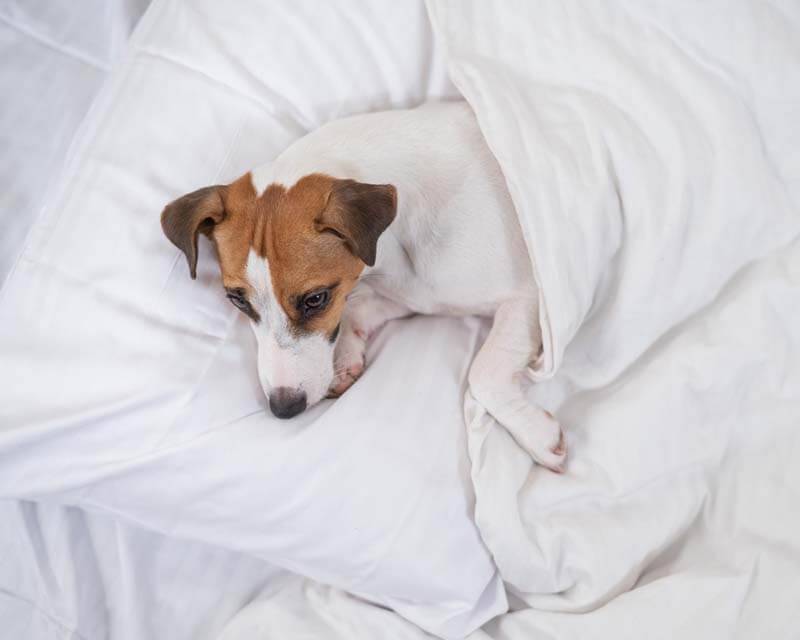
Hunger
One of the most common and easy-to-fix causes of stomach noises is hunger. Some dogs may be more comfortable with frequent, smaller meals.
Gases
As the gas travels through the intestines and stomach, it can make noise. These sounds are usually relatively inconspicuous, but certain foods can be difficult to digest, resulting in louder rumblings. If you notice that your dog suddenly develops a lot of gas after eating a certain type of food, it is worth eliminating it.
Too much air in the digestive tract
If your dog eats or drinks quickly, plays hard or is nervous, and breathes frequently with his mouth open, he may swallow a lot of air. This leads to rumbling or belching.
Eating a foreign body and food debris
Excessive noise may indicate that the dog’s intestines are having trouble digesting what has been eaten. It can be poor-quality food, potentially dangerous products – onions, grapes, garlic, and even foreign bodies in the form of toys and other household items. If other symptoms are noted in addition to rumbling, especially lethargy, lack of coordination or hyperactivity, vomiting and pain, consult a doctor.
Impending diarrhea
If your dog’s stomach growls loudly, this may be a warning call that he needs to go to the toilet, and diarrhea is imminent. Be sure to try to determine the underlying cause of the indigestion and contact your veterinarian.
Inflammatory Bowel Disease (IBD)
Dogs with IBD are more likely to have indigestion, which can lead to regular rumbling in the stomach.
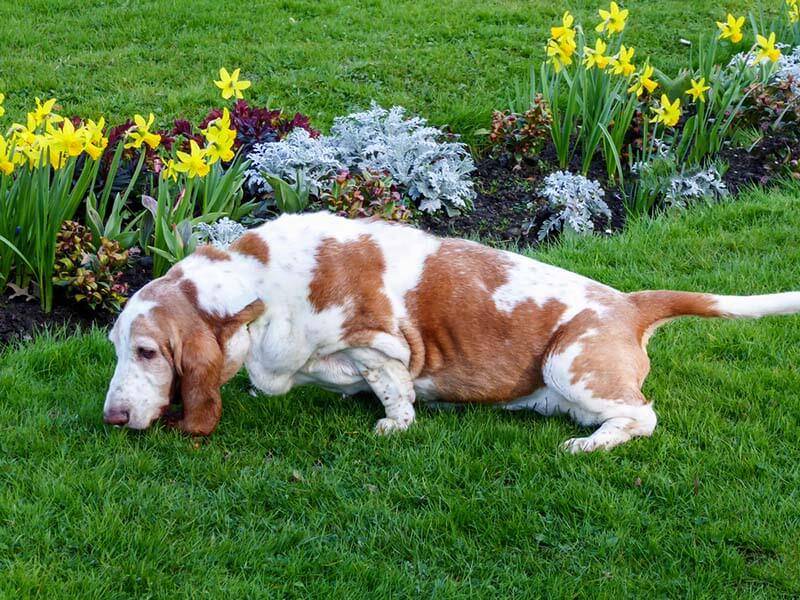
Intestinal parasites
Intestinal parasites such as roundworms, hookworms, whipworms and tapeworms, giardia, Trichomonas, and many others can cause excessive gas and inflammation, leading to disturbing abdominal noises.
bacterial overgrowth of the small intestine
The condition, which occurs when bacteria begins to multiply in a dog’s small intestine, can cause several symptoms, including flatulence and stomach murmurs.
Poor quality of food and feed
Dogs fed poor quality foods (especially those with unnecessarily high carbohydrate content) often have noisy stomachs. In such cases, the noises are caused by excessive fermentation of bacteria and fungi living in the digestive tract, which leads to gas formation.
Problems with the liver
If your dog has liver-related metabolic problems, loud stomach murmurs can be very common. Other associated symptoms include changes in appetite, excessive thirst, vomiting, and diarrhea.
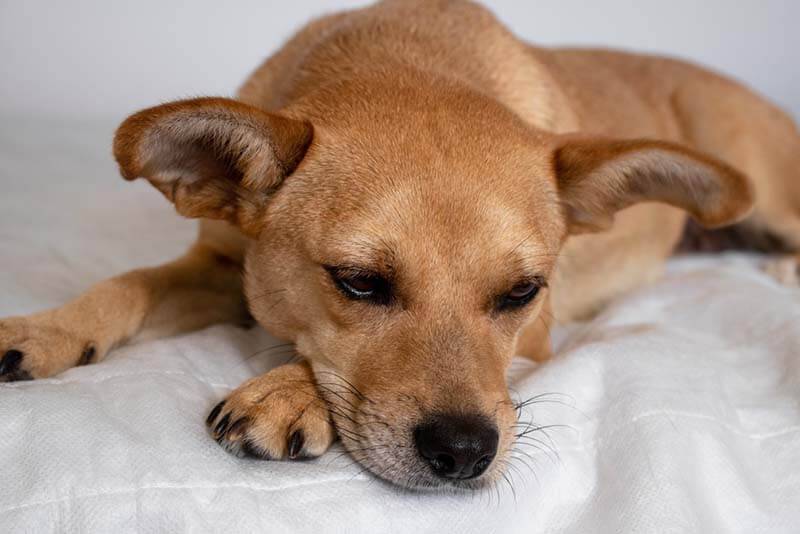
What to do if the dog’s stomach is bubbling?
Hearing your dog’s stomach making more noises than usual can be alarming, but in most cases it can be attributed to a simple case of gas buildup or hunger. If your dog is otherwise well behaved, eating and pooping normally, he’s probably fine. You need to feed the dog or move more with it, since active exercise accelerates intestinal motility, and gases will come out faster.
However, if your dog’s stomach is always making noises or making noises very often, it’s worth planning a trip to the veterinarian.
If your dog experiences any of the following symptoms in addition to abdominal murmurs accompanied by rumbling, contact the clinic immediately:
Lethargy (slowness, lethargy, fatigue)
Hypersalivation (excessive salivation)
Appetite changes
Abdominal pain
Change in stool color, inclusions in the stool in the form of blood, mucus, particles of something incomprehensible, diarrhea or constipation.
To determine the cause of the abdominal noise, the doctor will examine and examine the dog. For this, an ultrasound of the abdominal cavity, a biochemical blood test and a clinical one are performed – these studies will help determine whether there are inflammatory processes, and where, helminthic invasion, oncology.
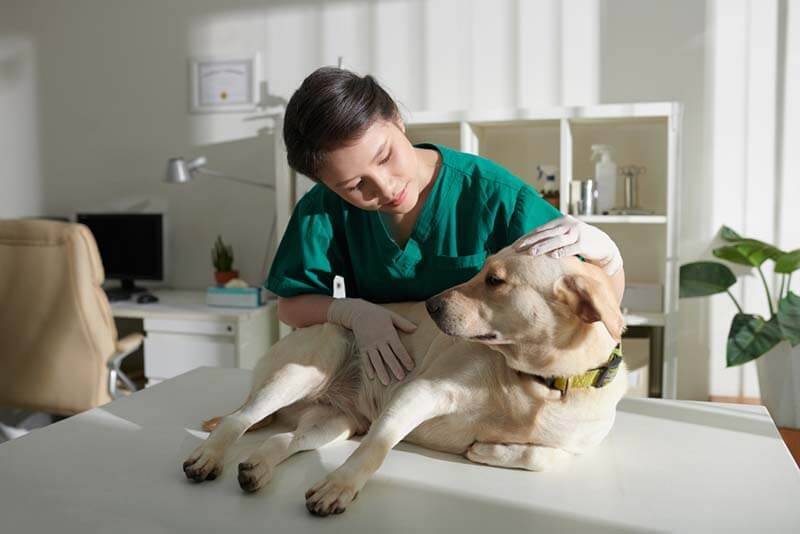
To detect a foreign body, an additional study is performed in the form of X-rays and X-rays with contrast soldering.
If infectious processes are expected (viruses, bacteria or protozoan parasites), then specific studies will be required to determine them – rectal swabs or swabs for PCR diagnostics.
Treatment will depend on the cause. The cause of rumbling is eliminated and symptomatic therapy is prescribed. Often doctors use – diet therapy, gastroprotectors and antibiotics, antispasmodics for the intestines, probiotics and bots.
If the cause of rumbling is hunger, dietary errors, then for treatment it may be enough to change the feeding pattern and diet. Feed often and in small portions. Many feed manufacturers have special diets for the treatment of the gastrointestinal tract.
When the reason for the rumbling is fast eating of food and the accumulation of gas in the stomach, then you will need to use special “smart” bowls so that the dog eats more slowly, and bobotik to collapse gases in the stomach and intestines.
When eating foreign objects, they will need to be removed – surgically or with an endoscope, and then – symptomatic therapy.
With the development of IBD, a bacterial infection or a viral infection, the doctor first selects the appropriate antibiotic and diet, while simultaneously prescribing symptomatic therapy.
If the cause is parasites, then anthelmintic treatment and treatment for protozoa will be prescribed, based on the type of parasite.
If the dog is seething in the stomach, there are no other complaints, you can use bobotiki at home, drugs that collapse gas bubbles in the intestines and quickly alleviate the condition of bloating – “Espumizan”, for example.
If a puppy growls in the stomach
Grumbling in the puppy’s stomach often happens when switching from one type of feeding to another – from milk to complementary foods, from complementary foods to solid food. During this period, moderate gurgling and bloating is a variant of the norm, while the intestines rebuild their work to digest new food.
To facilitate the transition, you can add probiotics to your diet, feed small meals frequently, and transition gradually over 10-14 days.
If the puppy rumbles strongly in the stomach, it worries him, he moves little, and the tummy is swollen, it is worth reviewing the diet. You also need to see a doctor to exclude frequent gastrointestinal diseases in young dogs – worms and viruses.
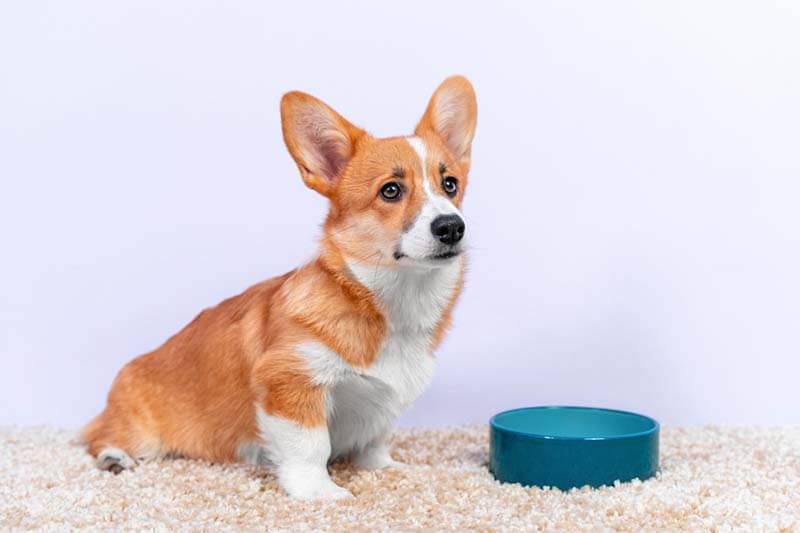
Prevention
In order to reduce the likelihood of seething in the stomach of a dog, it is enough to follow simple rules of keeping.
It is recommended to feed with quality feed or make a natural diet with a nutritionist to maintain a balance of nutrients. Avoid eating junk food, hazardous foods and foreign bodies.
Regularly carry out treatments for helminths every 3-4 months.
Vaccinate annually as recommended by veterinarians.
Do not allow prolonged hunger for more than 10-12 hours. If a dog of a miniature breed – Spitz, Yorkie, Toy, Chihuahua – then no more than 8 hours. Eating rate control – Large breed dogs, such as Labrador Retrievers, German Shepherds, and large litter dogs, are especially fast eaters. To slow down, you can use labyrinth feeders.
Regularly conduct a medical examination of the dog – ultrasound of the abdominal cavity, blood tests.
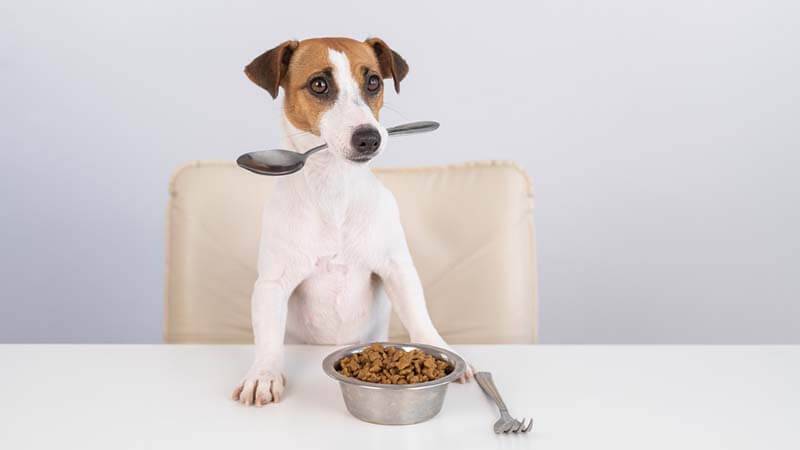
The dog’s stomach rumbles – the main thing
Normally, a pet’s stomach can sometimes rumble.
Pathological causes of rumbling in the dog’s stomach are inflammation of the intestines, eating a foreign body, parasites, poor-quality diet, diseases of the digestive system.
With a physiological norm, seething occurs rarely and has no accompanying symptoms. If there are other complaints – a change in stool, appetite, pain – it is worth contacting the clinic and examining the dog.
To reduce the symptoms of rumbling, a pet can be fed, actively moved with him, or given a drug to reduce gas formation in the abdomen.
Why does the dog growl and gurgle strongly in the stomach, what could be the reasons and what to do – we examined all this in detail in the article. Just like us, our pets can sometimes have noisy stomachs due to various factors and not always require treatment.
Answers to frequently asked questions
Sources:
Hall, Simpson, Williams: Canine and Cat Gastroenterology, 2010
Kalyuzhny I. I., Shcherbakov G. G., Yashin A. V., Barinov N. D., Derezina T. N.: Clinical Animal Gastroenterology, 2015
Willard Michael, Chronic colonic diarrhea, Library of articles of the Sotnikov veterinary clinic.
29 2022 June
Updated: 29 June 2022



